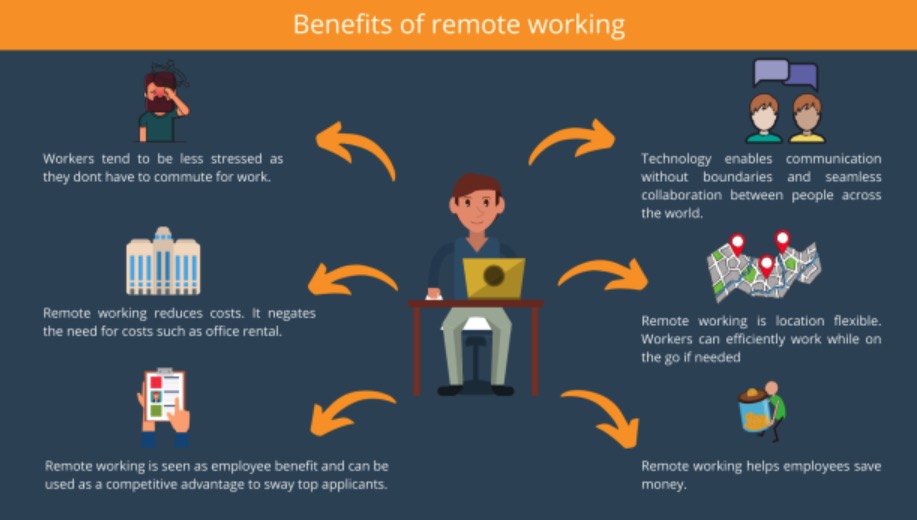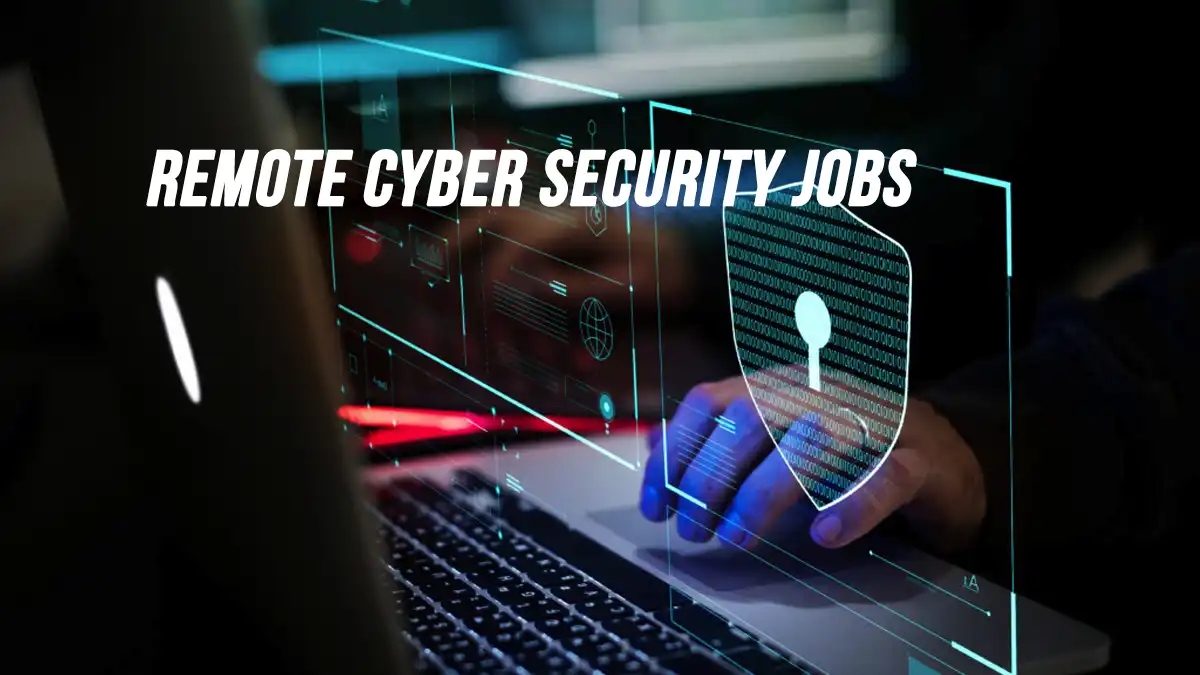Remote Cyber Security Jobs – In an increasingly digitized world, cybersecurity has become one of the most critical fields. Protecting sensitive data, ensuring privacy, and securing networks are more important than ever.
With technological advancements and the rise of remote work, cybersecurity roles are increasingly moving online. This article explores the landscape of remote cybersecurity jobs[1], the opportunities available, skills required, and tips for thriving in a remote cybersecurity role.
The Growing Demand for Remote Cyber Security Jobs
The demand for cybersecurity professionals has surged in recent years. As companies store more data in the cloud and remote work becomes the norm, the risks associated with cyber-attacks have risen. Remote Cyber Security Jobs demand has given rise to various remote cybersecurity roles, offering professionals flexibility and a rewarding career path.
Why Companies Are Hiring Remote Cybersecurity Experts
Companies are more vulnerable to cyber threats than ever before. With distributed teams and decentralized data, the attack surface for hackers has expanded. Remote Cyber Security Jobs Hiring remote cybersecurity professionals allows organizations to tap into a global talent pool, ensuring they have the expertise to safeguard their systems without geographical constraints.
Industries in Need of Remote Cybersecurity Talent
Cybersecurity is no longer just a concern for tech companies. Industries such as healthcare, finance, government, and retail have seen a sharp increase in cyber threats. Remote Cyber Security Jobs sectors are actively seeking skilled cybersecurity professionals who can work remotely to protect sensitive data from breaches and other malicious activities.
Growth Projections for Remote Cybersecurity Jobs
The cybersecurity job market is booming, and remote roles are becoming a significant part of this growth. According to industry reports, the demand for cybersecurity professionals is expected to grow by 31% from 2019 to 2029, significantly faster than the average for other professions. Remote Cyber Security Jobs Remote positions are becoming increasingly common as companies adapt to changing work environments.
Types of Remote Cybersecurity Jobs
Cybersecurity is a broad field, encompassing various roles that cater to different skills and interests. Whether you’re just starting your career or looking for a specialized niche, there are many remote cybersecurity job opportunities available.
Cybersecurity Analyst
Cybersecurity analysts are responsible for monitoring networks for potential security breaches and investigating when incidents occur. Remote Cyber Security Jobs In a remote setting, analysts use specialized software and tools to detect threats and implement security measures from anywhere in the world.
Penetration Tester (Ethical Hacker)
Penetration testers, often referred to as ethical hackers, are hired to simulate cyber-attacks on an organization’s systems. Their job is to find vulnerabilities before malicious hackers can exploit them. This role is well-suited for remote work, as penetration testers primarily use digital tools to perform their assessments.
Incident Responder
Incident responders are the first line of defense when a cyber-attack happens. They must quickly assess the situation, contain the threat, and work towards recovery. Remote Cyber Security Jobs While the job can be fast-paced and stressful, it is highly rewarding and can easily be performed remotely with the right tools and communication channels.
Skills Needed for Remote Cybersecurity Roles
Cybersecurity is a highly specialized field that requires both technical and soft skills. Professionals in remote cybersecurity roles need to be proficient in various areas to effectively safeguard their organization’s digital assets.
Technical Expertise
Technical skills are the foundation of any cybersecurity role. Whether it’s understanding firewalls, encryption protocols, or malware, cybersecurity professionals must be able to navigate and manage complex systems. Remote Cyber Security Jobs They also need to be adept at using specialized tools for threat detection and response, many of which are cloud-based and accessible remotely.
Problem-Solving Abilities
Cybersecurity professionals frequently face unpredictable situations. Whether it’s a sudden data breach or a new type of malware, remote cybersecurity workers need sharp problem-solving skills to address issues as they arise. Remote Cyber Security Jobs In many cases, quick and effective action can prevent a small issue from becoming a major catastrophe.
Communication Skills
In a remote setting, clear communication becomes even more essential. Cybersecurity professionals often work with teams, stakeholders, or clients who may not have technical knowledge. Remote Cyber Security Jobs Being able to explain complex cybersecurity concepts in simple terms is crucial to ensure that everyone is on the same page when mitigating risks.
How to Get Started in Remote Cybersecurity Jobs

Entering the cybersecurity field can be daunting, especially for remote positions. Remote Cyber Security Jobs However, with the right qualifications and approach, it’s possible to secure a rewarding remote cybersecurity job.
Educational Requirements
While many cybersecurity professionals hold degrees in computer science or information technology, this isn’t always a necessity. Various certification programs, such as CompTIA Security+, Certified Information Systems Security Professional (CISSP), and Certified Ethical Hacker (CEH), are highly regarded in the industry and can often serve as a substitute for a formal degree.
Gaining Experience Through Internships and Freelance Work
For beginners, gaining hands-on experience is key. Many organizations offer internships that can be completed remotely. Remote Cyber Security Jobs Freelancing is another option, as there is a growing demand for short-term cybersecurity projects. These opportunities allow you to build a portfolio, making it easier to secure long-term remote roles.
Building a Professional Network
Networking is essential in any career, and cybersecurity is no different. Joining online forums, attending webinars, and participating in cybersecurity conferences can help you connect with professionals in the field. Remote Cyber Security Jobs connections can lead to job opportunities, mentorship, and valuable advice on navigating the remote cybersecurity landscape.
Challenges of Working in Remote Cybersecurity
While working remotely in cybersecurity offers flexibility and autonomy, it also comes with its own set of challenges. It’s essential to be aware of these potential hurdles and develop strategies to overcome them.
Managing Security Risks in a Remote Environment
Ironically, remote cybersecurity professionals often face security risks themselves. Working outside of a centralized office increases the risk of data breaches or other cyber threats. It’s important to use secure networks, enable two-factor authentication, and follow best practices to protect sensitive information while working remotely.
Maintaining Work-Life Balance
Remote work can blur the lines between personal and professional life. This is especially true in cybersecurity, where emergencies can occur at any time. Remote Cyber Security Jobs Setting clear boundaries, creating a designated workspace, and scheduling regular breaks can help maintain a healthy work-life balance.
Staying Updated with Industry Trends
Cybersecurity is a rapidly evolving field, and professionals need to stay updated with the latest trends and threats. Remote Cyber Security Jobs can be challenging when working remotely, as there is less direct interaction with colleagues. However, subscribing to industry newsletters, taking online courses, and attending virtual conferences can help keep you informed.
Tools for Remote Cybersecurity Jobs
Working in cybersecurity remotely requires access to the right tools. These tools are essential for detecting, managing, and responding to threats, as well as collaborating with other team members.
Virtual Private Networks (VPNs)
A VPN is essential for any remote cybersecurity professional. It ensures that all communications are encrypted and secure, especially when working from public or unsecured networks. Remote Cyber Security Jobs VPNs also allow remote workers to access the company’s internal network safely.
Threat Detection Software
Various software solutions help cybersecurity professionals detect potential threats in real-time. These include tools like intrusion detection systems (IDS) and security information and event management (SIEM) software, which monitor network traffic and provide insights into potential security issues.
Collaboration Tools
Since cybersecurity often requires teamwork, collaboration tools like Slack, Microsoft Teams, or Zoom are essential. Remote Cyber Security Jobs tools facilitate real-time communication and allow remote workers to coordinate with other team members and stakeholders efficiently.
Benefits of Working in Remote Cybersecurity Jobs

Remote cybersecurity roles offer numerous advantages for both professionals and employers. Remote Cyber Security Jobs From flexibility to career growth, these benefits make the field even more attractive.
Flexibility and Autonomy
One of the most appealing aspects of remote cybersecurity jobs is the flexibility they offer. Professionals can work from anywhere, manage their own schedules, and often enjoy a better work-life balance compared to traditional office jobs. Remote Cyber Security Jobs autonomy allows for a more tailored and personalized work experience.
Access to a Global Job Market
Remote work removes geographical limitations, allowing cybersecurity professionals to seek job opportunities across the globe. This opens up a wide array of positions, giving candidates the freedom to choose roles that align with their career goals and interests.
Competitive Salaries
Remote cybersecurity professionals often enjoy competitive salaries, reflecting the high demand for their skills. In many cases, remote workers can negotiate for even higher pay due to the specialized nature of their roles and the scarcity of qualified candidates in the global job market.
Tips for Succeeding in Remote Cybersecurity Jobs
Succeeding in a remote cybersecurity role requires discipline, adaptability, and a strong commitment to personal and professional development. Here are some tips for excelling in this field.
Stay Organized and Disciplined
Working remotely requires self-discipline. It’s crucial to create a routine, set daily goals, and prioritize tasks to ensure productivity. Keeping an organized workspace and adhering to a schedule can help maintain focus throughout the day.
Communicate Effectively with Team Members
Clear and effective communication is key in a remote environment. Since you’re not physically present with your team, it’s important to stay connected through regular check-ins, updates, and meetings. This ensures that everyone is aligned and that any issues are addressed promptly.
Invest in Continuous Learning
Cybersecurity is a fast-paced field, and continuous learning is essential for long-term success. Remote cybersecurity professionals should invest time in upskilling through certifications, online courses, and staying informed about new threats and security technologies.
Future Trends in Remote Cybersecurity Jobs

As technology continues to evolve, so too will the landscape of remote cybersecurity jobs. Several trends are shaping the future of this field, making it an exciting area for career growth.
Increased Use of Artificial Intelligence (AI)
Artificial intelligence is transforming the cybersecurity industry. AI tools are being used to automate threat detection, analyze large data sets, and predict potential vulnerabilities. Remote cybersecurity professionals will need to understand AI-driven technologies to stay competitive in the job market.
The Rise of Zero Trust Security Models
Zero trust models, which assume that threats are present both inside and outside the network, are becoming increasingly popular. This approach requires continuous verification of every user and device accessing the system, creating new opportunities for remote cybersecurity experts to develop and implement these models.
Expansion of Cloud Security Roles
With the growing reliance on cloud-based services, there is an increasing need for cybersecurity professionals specializing in cloud security. Remote workers with expertise in securing cloud environments will find ample opportunities in this rapidly expanding field.
Conclusion
Remote cybersecurity jobs offer a unique blend of flexibility, growth potential, and job security. As the demand for cybersecurity professionals continues to rise, those with the right skills and mindset will find numerous opportunities to build a successful career in this field.
By staying updated with industry trends, investing in continuous learning, and leveraging the right tools, professionals can thrive in the ever-evolving world of remote cybersecurity.
FAQs about Remote Cyber Security Jobs
-
What types of remote cyber security jobs are out there?
There are plenty! You can find roles like security analyst, penetration tester, incident responder, and security architect. Companies are always on the lookout for skilled pros to help protect their digital assets!
-
Do I need a specific degree to get a remote cyber security job?
Not necessarily! While many roles prefer a degree in computer science or a related field, certifications like CISSP or CEH can really boost your chances. Skills and experience often matter just as much, if not more!
-
What skills should I focus on to succeed in remote cyber security?
Technical skills like network security, threat analysis, and incident management are key. Don’t forget soft skills too—communication and problem-solving abilities are super important when collaborating with teams remotely.
-
How do I find remote cyber security jobs?
Start by checking out job boards dedicated to tech, like CyberSecJobs, or platforms like LinkedIn. Networking in online forums and communities can also lead to great opportunities!
-
Is remote work in cyber security flexible?
Absolutely! Many companies offer flexible schedules, allowing you to work when you’re most productive. Just make sure to communicate with your team to stay aligned on projects.
-
What challenges might I face while working remotely in cyber security?
One challenge can be staying up-to-date with security trends and tools since things change quickly. Additionally, working from home can feel isolating, so finding ways to connect with your team is key!
-
How important is having a home office setup for remote cyber security work?
Very important! A dedicated workspace helps you focus and stay organized. Invest in a good computer, ergonomic furniture, and reliable internet to create a productive environment.
-
Can I transition to remote cyber security from a different IT role?
Definitely! If you have a background in IT, you likely have transferable skills. Consider taking some specialized training or certifications to bridge any gaps and show employers you’re serious about the switch!
Reference
